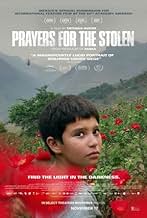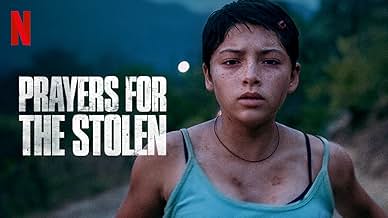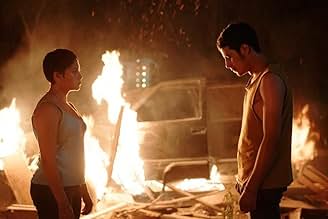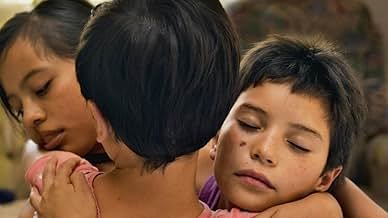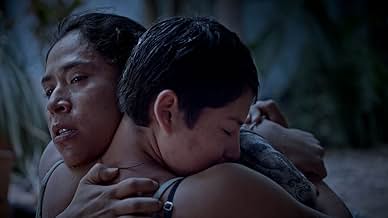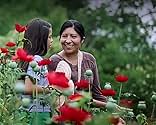IMDb RATING
7.3/10
4.4K
YOUR RATING
Life in a town at war seen through the eyes of three young girls on the path to adolescence.Life in a town at war seen through the eyes of three young girls on the path to adolescence.Life in a town at war seen through the eyes of three young girls on the path to adolescence.
- Director
- Writers
- Stars
- Awards
- 23 wins & 36 nominations total
- Director
- Writers
- All cast & crew
- Production, box office & more at IMDbPro
Featured reviews
Yikes but this is quite a difficult film to watch. It's centred around three teenage girls who live amidst the poppy fields of Mexico. "Ana" (Maria Membreño) "Paula" (Alejandro Camacho) and "Maria" (Giselle Barrera Sánchez) try to live their lives as normally as they can, but the fact that their school teacher is leaving because he won't pay protection money to the drug pedlars gives us some indication of the society in which they live. Indeed, it's this teacher who raises the issue of a missing girl - and that enlightens us to the fact that once they reach a certain age, these young women have other "uses" and nobody dares speak out about it. The chronology flits between the current life of these three and their younger childhood and illustrates that for them, there is little hope of change unless they are prepared to leave - but that they don't want to do with out each other or their mothers (the fathers don't feature at all in this drama). The rather courageous role of motherhood is really well exemplified by Mayra Batalla's contribution as "Rita". A woman who treats her daughters first menstruation with a dread that the young girl does not yet appreciate the significance of. It's a beautifully photographed vicious circle, with the emphasis on vicious. There are attempts at government interventions, local troops stationed and helicopters depositing toxins on the flowers, but the thrust here from director Tatiana Huezo is of a cycle of depressing and dangerous inevitability that it is difficult to see a way out of. The three young actors perform evocatively here offering us quite emotional and poignant characterisations. They are not simply going to give up - but it's not that simple. Harrowing, yes, but it's clearly been written and presented offering hope for the girls and to raise some awareness of the fact that as long as the West keeps buying the stuff, these people will live in a modern day slavery that turns your stomach.
Anna, Paula and Maria are three young girls growing up in a remote mountain town in the Mexican rainforest. Poppies are grown locally and harvested by the townspeople controlled by the Cartels. Life is precarious and the balance of power between Police, Cartel and Military is tenuous at best. This is impeccable Social Realist film with many captivating performances from non actors. If you like the genre you will like this one. 8/10.
Shedding light on the fearful existence & perilous life that women & children are forced to live in Mexican towns ravaged by drug trade, cartel violence & human trafficking, Prayers for the Stolen (Noche de fuego) captures this brutal reality through the coming-of-age journey of a young girl & her two best friends and makes for a gritty, affecting & heartbreaking slice of social realism.
Written & directed by Tatiana Huezo in her feature film debut, the film benefits from her earlier efforts as a documentarian as she utilises a similar raw style & uncompromising approach that adds a realistic touch & unflinching quality to the drama and allows it to unfold at its own pace while remote setting, grim atmosphere & sincere performances further strengthen the material.
However, the emotional impact the film was aiming for doesn't translate as well as it should've, for much of the plot remains uneventful, some scenes drag on for too long while others are cut earlier than expected, thus resulting in a picture that's harsh & harrowing in bits n pieces yet is unable to get under the skin. The film presents the difficult state of affairs but doesn't truly dig into it.
Overall, Prayers for the Stolen explores friendship, endurance, loss of innocence, cartel terror & endemic violence to give the audience an insight into the dark side of modern-day Mexico, and begins Huezo's feature filmmaking endeavours on a promising note if not a rewarding one. The performances are strong & gripping but the characters & situations depicted still required more development & fine tuning. Worth a shot anyway.
Written & directed by Tatiana Huezo in her feature film debut, the film benefits from her earlier efforts as a documentarian as she utilises a similar raw style & uncompromising approach that adds a realistic touch & unflinching quality to the drama and allows it to unfold at its own pace while remote setting, grim atmosphere & sincere performances further strengthen the material.
However, the emotional impact the film was aiming for doesn't translate as well as it should've, for much of the plot remains uneventful, some scenes drag on for too long while others are cut earlier than expected, thus resulting in a picture that's harsh & harrowing in bits n pieces yet is unable to get under the skin. The film presents the difficult state of affairs but doesn't truly dig into it.
Overall, Prayers for the Stolen explores friendship, endurance, loss of innocence, cartel terror & endemic violence to give the audience an insight into the dark side of modern-day Mexico, and begins Huezo's feature filmmaking endeavours on a promising note if not a rewarding one. The performances are strong & gripping but the characters & situations depicted still required more development & fine tuning. Worth a shot anyway.
Tatiana Huezo Sánchez who is best known for her documentaries, turns her attention to fiction with a coming of age drama based on Jennifer Clement's novel of the same title. It tells the story of Ana and her two best friends who discover a shocking reality - and a hostile world amidst the drug trafficking in Mexico. It gives a personal touch to something we hear at a distance on the internet. From the first moments of the film, Tatiana chooses to film this through the details, her camera focussing on the minutiae of the environment. She plunges us into an peaceful atmosphere, behind the lush green setup, we feel a discomfort and a lively tension underlying between the villagers. They depends on poppy harvest to make ends meet. There are semi-detached houses with hiding place and girls are made to sport boyish haircuts to escape from the eyes of human traffickers. There is absolutely no hope for the little girls and they tend to get worse as time goes on.
Initially, I was just expecting another usual documentary with realism tag, while storyline does follow the formula, its the treatment that appealed. It has a lot more than one would expect. It seems like a tearjearker war film, but when you dive into it you'll likely see a different pov. The pacing is easy and there is no rush on Tatiana's behalf to get to 'the story', as it were, but rather a strong sense of atmosphere and indulges the viewer through this lack of urgency. It contains an atmospheric and evocative cinematography by Dariela Ludlow Deloya. It is supported with subtle score by Jacobo Lieberman and Leonardo Heiblum. As well as adequate sound design by Lena Esquenazi.
Overall, it is a great proof that this film depicts childhood and adolescence of three girls is by no means exaggerated. It's blends early Jorge Silva, Marta Rodríguez, Alanis Obomsawin's style and is almost like a companion piece to Identifying Features (2020) and Birth Certificate (1961); both thoroughly bleak and does scream for help with no chance for hope.
Initially, I was just expecting another usual documentary with realism tag, while storyline does follow the formula, its the treatment that appealed. It has a lot more than one would expect. It seems like a tearjearker war film, but when you dive into it you'll likely see a different pov. The pacing is easy and there is no rush on Tatiana's behalf to get to 'the story', as it were, but rather a strong sense of atmosphere and indulges the viewer through this lack of urgency. It contains an atmospheric and evocative cinematography by Dariela Ludlow Deloya. It is supported with subtle score by Jacobo Lieberman and Leonardo Heiblum. As well as adequate sound design by Lena Esquenazi.
Overall, it is a great proof that this film depicts childhood and adolescence of three girls is by no means exaggerated. It's blends early Jorge Silva, Marta Rodríguez, Alanis Obomsawin's style and is almost like a companion piece to Identifying Features (2020) and Birth Certificate (1961); both thoroughly bleak and does scream for help with no chance for hope.
When I went to see this movie, I knew it was gonna be tough, but I didn't imagine it to make me cry that much. The story really goes to the heart.
Also, the child actors did a wonderful job!
Also, the child actors did a wonderful job!
Did you know
- TriviaOfficial submission of Mexico for the 'Best International Feature Film' category of the 94th Academy Awards in 2022. It made the shortlist but did not end up nominated.
- SoundtracksCariñito
Written by Ángel Aníbal Rosado
Performed by Zindu Cano, Vivir Quintana, Alejandro Díaz, Leo Soqui, Rodrigo Garibay, Alfonso Figueroa, Leonardo Heiblum and Jacobo Lieberman
- How long is Prayers for the Stolen?Powered by Alexa
Details
- Release date
- Countries of origin
- Official sites
- Language
- Also known as
- Молитви за викрадених
- Filming locations
- Production companies
- See more company credits at IMDbPro
- Runtime1 hour 51 minutes
- Color
- Aspect ratio
- 1.78 : 1
Contribute to this page
Suggest an edit or add missing content




